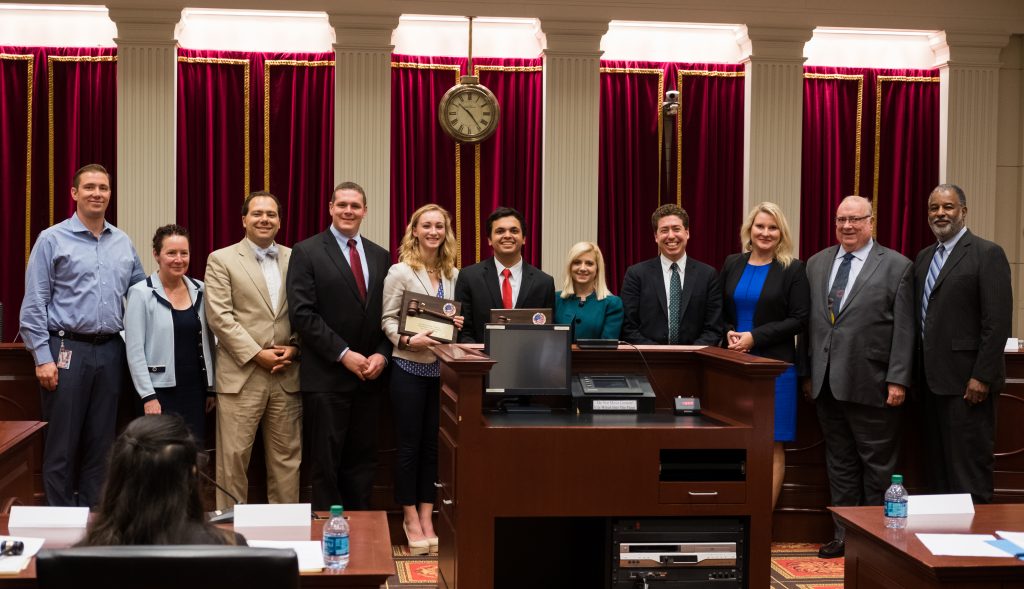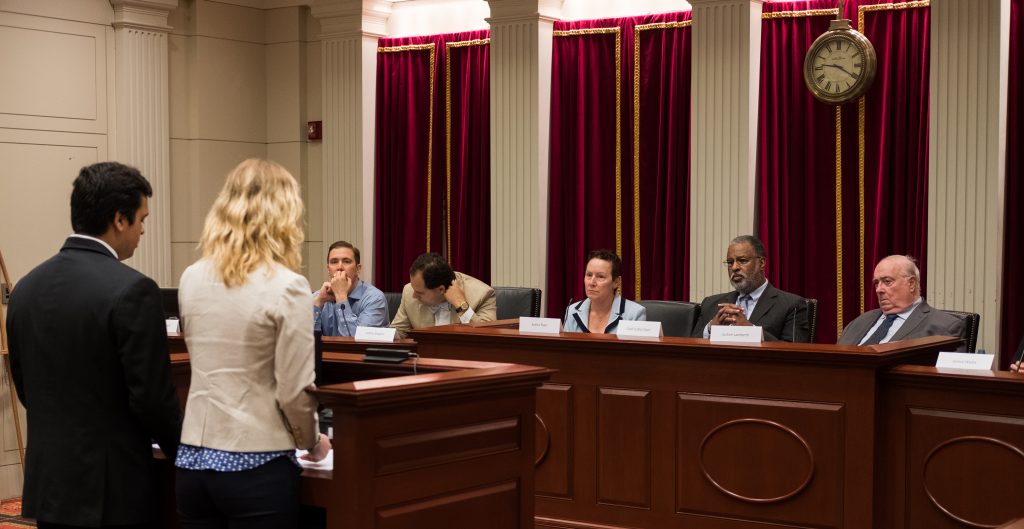Timbs v. State of Indiana
Certiorari granted by the United States Supreme Court on June 18, 2018
Oral arguments TBD
Outline:
The Question Presented
Whether the Eighth Amendment’s Excessive Fines Clause should be incorporated through the Due Process Clause of the Fourteenth Amendment or the Privileges or Immunities Clause of the 14th Amendment?- Petitioners Timbs will argue that the Excessive Fines Clause should only be incorporated through the Privileges or Immunities Clause of the 14th Amendment.
- Respondent State of Indiana will argue that the Excessive Fines Clause should only be incorporated through the Due Process Clause of the 14th Amendment
(jump to the top of the page)
Case Background
In January 2013, Tyson Timbs purchased a Land Rover for $42,058.30. He paid for the car with money he had inherited from his father's life insurance policy.) When Timbs bought the Land Rover it had 1,237 miles on its odometer. Over the next five months he drove more than 16,000 miles in the vehicle.
Timbs regularly drove the Land Rover between Marion and Richmond, Indiana, to buy and transport heroin. A confidential police informant learned of Timbs’s drug trafficking. The informant told a member of the Joint Effort Against Narcotics team that he could buy heroin from Timbs. The police set up a controlled drug purchase: the informant and an undercover detective bought two grams of heroin from Timbs for $225. The police made another controlled buy a couple of weeks later, acquiring another two grams of heroin for $160. During the second buy, the detective set up a third controlled buy with Timbs. The day the third buy was to occur, the police apprehended Timbs during a traffic stop.
In June 2013, the State charged Timbs with two counts of dealing a controlled substance and one count of conspiracy to commit theft. Nearly two years later, in 2015, Timbs pleaded guilty to one count of felony dealing and one count of felony conspiracy to commit theft. In exchange the state dismissed the remaining charge. The trial court accepted the plea and sentenced Timbs to six years, with one year in home detention (with his aunt) and five years on probation. Timbs also agreed to pay police costs of $385, an interdiction fee of $200, court costs of $168, a bond fee of $50, and a $400 fee for undergoing a drug-and-alcohol assessment with the probation department.
Several months after bringing criminal charges, a private law firm filed a civil case against Timbs to force him to forfeit his vehicle, on behalf of the State. After a bench trial, the judge issued written findings that denied the state’s action. The Court concluded that forfeiture of $42,058.30--the amount of the car--would be an excessive fine under the Eighth Amendment. “The amount of the forfeiture sought is excessive, and is grossly disproportional to the gravity of the Defendant’s offense.” The trial court observed that the maximum statutory fine for Timbs’s Class B felony was $10,000 on the day he was arrested.he vehicle was worth approximately four times this amount when Timbs purchased it just a few months earlier. The court made no finding about the vehicle’s value on the date of Timbs’s arrest. The court ordered the state to release the vehicle immediately.
After reviewing the case, the Indiana Supreme Court concluded that the Excessive Fines Clause does not bar the state from forfeiting Timb’s vehicle, because the United States Supreme Court has not yet held that the Clause applies to the States through the Fourteenth Amendment.
The full decision from the Indiana Supreme Court can be found here.
(jump to the top of the page)The Law
U.S. Constitution, Amendment VIII (1791)
“Excessive bail shall not be required, nor excessive fines imposed, nor cruel and unusual punishments inflicted.”
U.S. Constitution, Amendment XIV (1868)
“All persons born or naturalized in the United States, and subject to the jurisdiction thereof, are citizens of the United States and of the state wherein they reside. No state shall make or enforce any law which shall abridge the privileges or immunities of citizens of the United States; nor shall any state deprive any person of life, liberty, or property, without due process of law; nor deny to any person within its jurisdiction the equal protection of the laws.”
Ind. Const. art. I, § 16
“Excessive bail shall not be required. Excessive fines shall not be imposed. Cruel and unusual punishments shall not be inflicted. All penalties shall be proportioned to the nature of the offense.”
(jump to the top of the page)
Supreme Court Cases
- Slaughterhouse Cases, 83 U.S. 36 (1873)
- Chicago Burlington & Quincy Railroad Co. v. City of Chicago, 166. U.S. 226 (1897)
- Robinson v. California, 370 U.S. 660 (1962)
- Schilb v. Kuebel, 404 U.S. 357 (1971)
- McDonald v City of Chicago, 561 U.S. 742 (2010): Students should read and consider Justice Thomas’s concurring opinion. It discussed incorporation of the right to keep and bear arms under the Privileges or Immunities Clause of the Fourteenth Amendment.
Secondary Resources
- Brief of Petitioner Tyson Timbs (pp. 37-40)
- Brief of the Constitutional Accountability Center (pp. 12-16)
- Cornell Legal Information Institute, Incorporation Doctrine
- Kurt Lash, The Origins of the Privileges or Immunities Clause, Part I: 'Privileges and Immunities' as an Antebellum Term of Art
- Gerard N. Magliocca, Why Did the Incorporation of the Bill of Rights Fail in the Late Nineteenth Century?
- David L. Hudson, Jr., The Fourteenth Amendment and Incorporation, ABA Insights on Law and Society (2017)
- Timbs v. Indiana, SCOTUSblog
- Vikram Amar discusses Incorporation Doctrine (Center for Civic Education)
- Scott W. Howe, The Implication of Incorporating The Eighth Amendment Prohibition on Excessive Bail
- Barnett & Blackman on the Privileges or Immunities Clause
Tournament Instructions
Resolved:
Whether the Eighth Amendment’s Excessive Fines Clause should be incorporated through the Due Process Clause of the Fourteenth Amendment or the Privileges or Immunities Clause of the 14th Amendment?- Petitioners Timbs will argue that the Excessive Fines Clause should only be incorporated through the Privileges or Immunities Clause of the 14th Amendment.
- Respondent State of Indiana will argue that the Excessive Fines Clause should only be incorporated through the Due Process Clause of the 14th Amendment
The Brief
Coaches can register their teams at the Institute of Competition Sciences. After registering, teachers should contact the Harlan Institute and ConSource at info@HarlanInstitute.org, and we will randomly assign teams to argue on behalf of the Petitioner or the Respondents. Teams will upload their briefs to the Institute of Competition Sciences page in PDF format. The brief should have the following sections:- Table of Cited Authorities: List all of the original sources, and other documents you cite in your brief.
- Statement of Argument: State your position succinctly in 250 words or less.
- Argument: By relying on at least two primary historical sources and at least three Supreme Court precedents in this lesson plan, structure an argument about how the Excessive Fines Clause should be incorporated. The more authorities you cite, the stronger your argument will be–and the more likely your team will advance.
- Conclusion: Summarize your argument, and argue how the Supreme Court should decide this issue.
- 2013 - Abigail Fisher v. University of Texas, Austin (I)
- 2014 - National Labor Relations Board v. Noel Canning
- 2015 - Zivotofsky v. Kerry
- 2016 - Abigail Fisher v. University of Texas, Austin (II)
- 2017 – Trinity Lutheran Church v. Comer
- 2018 - Carpenter v. United States
Preliminary Oral Arguments
In addition to the brief, each team must submit a YouTube video of their oral arguments. We will provide Coaches with questions to ask, who can supplement the moot with their own questions. Each argument must be at least ten minutes in length. A link to the videos must be be uploaded to the Institute of Competition Sciences by Friday, February 22, 2019. For examples of how the arguments should be structured please watch some of the submissions from past years.Oral Arguments Semifinals
The top sixteen teams will advance to the oral argument semifinals, which will be held virtually over Google Hangout on March 23, 2019. Oral arguments will be judged based on our scoring rubric. More information will be provided about the semifinals after the briefs are submitted.Oral Arguments Championship Round
The final round of the Virtual Supreme Court Competition will be held in Washington, D.C. (Last year, the event was hosted at the Georgetown University Law Center Supreme Court Institute). The Harlan Institute and ConSource will sponsor the top two teams, and their teachers, for a trip to Washington, D.C. in April 2019 to debate in front of a panel of expert judges, including lawyers, university level debate champions, and legal scholars.

